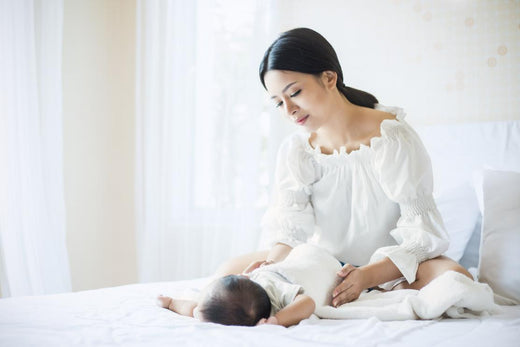
The 4-6 weeks post-delivery also known as the post-partum period is a major transitional period in the new mother’s life. During this period, she needs to regain her strength – mentally, emotionally and physically – and to adapt to her new role both domestically and socially. In helping the mother’s ongoing well-being, post-partum care involves both the family and healthcare providers, avoiding complications, a balanced diet, a hygienic and safe environment, as well as mental / emotional support. In many South East Asian countries, these few weeks are commonly known as the confinement period. During this period, the new mother is expected to follow certain traditional practices which are aimed to assist her to regain her health.
Origin of confinement practices
Confinement practices can be found in cultures throughout the world. It dates back to ancient times. It was known as ‘lying in’ period in Europe, ‘Zuo yue zi’ in China, ‘Sango no hidachi’ in Japan and ‘la cuarentena’ in Latin America.
How do confinement practices differ culturally?
Traditional confinement emphasizes the importance of keeping the mother’s body warm through food, rest and certain practices. These practices may be influenced by the climate, environment, spiritual and economic situation of the community at that time. For example, with ‘La cuarentena, the mother’s body is believed to be ‘open’ and is vulnerable to ‘draught or wind’i. Hence, the new mother is expected to cover her head and body and avoid washing her hair. With the Chinese ‘Zuo yue zi’, apart from protecting her body from draught, the mother is expected to eat warm or ‘yang’ foods and avoid cooling or ‘yin’ foodsii.
While the new mother is pampered with domestic assistance and special food, in Nepal and certain Hindu communities, it is an ‘unclean’ period and a special purifying ceremony is performed after the completion of the confinement period whereby the mother and child is received back into the communityiii.
Common traditional South East Asian confinement practices for the mother
Traditional confinement practices for the mother are usually divided into various categories of daily life and these include:
Diet
Foods are generally divided into carbohydrates, protein, fats, fruits vegetables, dairy and fluids. In traditional confinement diet, fruits such as watermelon and green leafy vegetables are deemed cooling or ‘yin’ and has to be avoided or restricted during the whole or part of the confinement period. On the other hand, ginger, sesame oil, alcohol, garlic, turmeric, lemongrass and onion are considered warm or yang and are bly encouragediv.

Personal Hygiene
A large portion of the South East Asian communities’ confinement practices are very similar as the new mother’s body is regarded as weak and needs to be ‘warmed up’. This belief leads to the practice of not washing hair or showering during the confinement period among the ethnic Chinese communities in Malaysia and Singaporeiv. The Malay / Indonesian traditional confinement practices allow the mother to shower / bath during confinement but are then kept warm by hot compress, dry saunas or lying on a bed warmed up with a stove underneathiv. Traditionally, Thai mothers are also not encouraged to shower or wash their hair during this period and they also practice the warm compress and warm bedsv.
Social / environmental / physical
In almost all the South East Asian communities, mothers in confinement are not encouraged to go out socially for 30-44 days. This is to avoid draught which is believed to cause ailments in later life. This leads to the practice of closing all windows and wearing warm clothing, socks and not going outdoors. This practice may have originated with the intention to ensure the mother has rest, avoid ‘wind entering the body’ and the belief that the mother could seem to be ‘unclean’. Instead, the new mother is encouraged to rest and not to physically exert herself doing household tasks like cooking, carrying heavy pails of water or going up and down the stairs. In many communities, a helper or family member will be assigned to assist with the domestic tasks of caring for the new mother.

Caring for self
While healthcare providers’ advice are evidence-based, many are aware and are respectful of the traditional practices, provided they do not present any harm to mother. They acknowledge that the new mother needs both physical and emotional rest, support and a balanced diet to regain and rebuild her strength. With regards to diet, foods from all the food groups are recommended in moderate amount to ensure that the new mother has all the necessary nutrients her body needs to regain and build strength. These include fruits, vegetables, nourishing fluids, fats, carbohydrates, dairy and proteinvi.
The new mother is vulnerable to perineal, uterine, urinary, breasts and skin infections. The need for good hygiene such as showering and proper hand washing is therefore vital.
Pelvic floor exercises, walking and gentle abdominal exercises are encouraged. These exercises will assist in toning up the pelvic floor and abdominal muscles while low intensity exercises such as walking is necessary for the mother’s physical and mental well-being.
Studies have shown that mental and physical rest together with emotional support especially by her family and spouse can reduce the incidences of Post Natal Depressionvii. A comfortable physical and domestic environment will be helpful in ensuring the new mother is well rested and settles into her role.
REFERENCES:
- https://onlinelibrary.wiley.com/doi/pdf/10.1111/j.1552-6909.2011.01298.x
- https://www.ncbi.nlm.nih.gov/pmc/articles/PMC1913060/, p. BMC Pregnancy Childbirth 2007
-
https://www.ncbi.nlm.nih.gov/pmc/articles/PMC4933986/, p. BMC Pregnancy childbirth 2016. Sheetal Shama)
http://chinabuddhismencyclopedia.com/en/index.php/Birth_Rituals_in_Hind… - https://www.healthxchange.sg/women/post-pregnancy/confinement-dos-donts
- https://onlinelibrary.wiley.com/doi/abs/10.1046/j.1365-2648.2003.02534.x
- https://www.stanfordchildrens.org/en/topic/default?id=the-new-mother---…
- https://www.nhs.uk/conditions/post-natal-depression/



